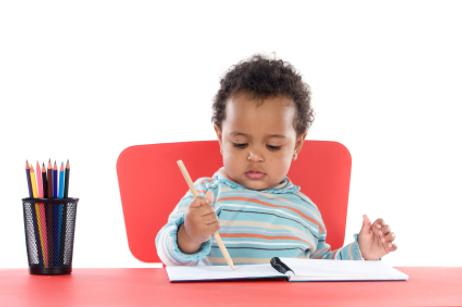Montessori schools are popular worldwide with parents of children in the primary grades. Interestingly enough, the educational concepts pioneered and codified by Dr. Maria Montessori (1870-1952) decades ago to educate mentally disabled and ineducable children in the inner city have morphed into a kind of schooling generally available only to middle and upper-class families nowadays.
How do I know a school is a genuine Montessori school?
Caveat emptor! Not every school which claims to be a Montessori school adheres to the founder's standards and methods. That is because the name Montessori has never been protected by trademark or copyright law. As a result, you can have a Montessori school with any strength of Montessori-ness you can imagine. In truth, the genuine article is a school member of the American Montessori Society. The association will have officially sanctioned it. It will have certified Montessori teachers using Montessori methods and equipment. That is not to say that a school that claims to be a Montessori school but is not part of the national association is any less good or adequate. That, as always, depends on the quality of the teachers and teaching. Remember that Montessori has become a household name, much like 'Xerox,' which is synonymous with 'copying. '
What is so appealing to parents about the Montessori method?
What, then, is so appealing about Dr. Montessori's methods? At the heart of her philosophy is that children learn differently from adults and should be allowed to learn wherever and whatever their innate curiosity inspires them to do. Learning by rote is eschewed. The child's soul finds its center and manner of expressing itself. Achievements flow from that self-confidence. It all sounds so hopelessly naive and quaint. But it works. Legions of Montessori schools, former and current students, and satisfied parents can attest to that.
This brief video shows Spruce Pine Montessori School in action.
The Montessori method has many features and characteristics that overlap with other approaches to early childhood education, such as Waldorf and Reggio Emilia. However, the Montessori method differs from these approaches in several respects.
What is the difference between a traditional preschool and a Montessori school?
The main thing to look for is the way the children are taught. The other feature of a Montessori classroom is the lesson structure. There are large blocks of time in the morning and the afternoon when the children work on various projects. Montessori classrooms are also noteworthy for the fact that they are child-driven as opposed to teacher-driven. Maria Montessori believed that teachers should "follow the child." Her research showed that children were naturally curious and willing to explore if left to their own devices with gentle guidance and direction as needed by the teacher. Another feature of Montessori classrooms is that they include children from several age groups. Most traditional preschool classrooms will typically have one age group per class.
What is the difference between a Montessori school and a Waldorf school?
Montessori and Waldorf schools share several things in common. They both emphasize the need for children to have the freedom to explore and use their imaginations. One difference is that teachers in Waldorf schools stay with their classes for several years, actually five to eight years as a rule. Why do they do that? The reason is that the teacher has a much better opportunity to know her students and adequately assess their progress and growth. Montessori schools tend to offer the early childhood years through what would be grade six in a traditional school. While Dr. Montessori did design her educational approach to go all the way through high school, the reality is that there are very few Montessori schools that offer what you and I would refer to as junior and senior high. Waldorf schools typically include the high school grades.
What is the difference between a Montessori school and a Reggio Emilia school?
For one thing, there are not many Reggio Emilia-inspired schools compared to the hundreds of Montessori schools available. Both schools have child-centered approaches. One distinctive feature of Reggio Emilia is that there is a lot of parent participation.
What, then, is so appealing about Dr. Montessori's methods? It is the idea that children learn differently from adults and should be allowed to learn wherever and whatever their innate curiosity inspires them to do. This idea is at the heart of the Montessori philosophy. Learning by rote is eschewed. The child's soul finds its center and manner of expressing itself. Achievements flow from that self-confidence. It all sounds so hopelessly naive and quaint. But it works. Legions of Montessori schools, former and current students, and satisfied parents can attest to that.
This video compares conventional schools with Montessori.
Many parents find the spontaneous approach to learning the Montessori way jibes with their philosophy of education. For many of us, it is a balancing act. We want our children to continue to explore the world around them just as they have since birth. But there is also a side of us that worries about how our children will cope with essential life skills such as reading, math, etc. The Montessori method relies on a skilled, well-trained, experienced teacher to adjust quickly to her students' various demands. She will do it without being the least obvious and observe a Montessori class or two to see what I mean. It will give you a better insight into Dr. Montessori's instruction to follow the child.
Another thing many of us parents appreciate about the Montessori method is that there are no grades, rankings, or comparisons within the classroom. Teachers observe their students and will share the results of those observations with you during parent-teacher conferences. Multi-age classes play well because older children can be helpful to younger children. Helping and showing younger children how to do something develops their tolerance, understanding, and leadership, which is also good.
Questions? You can contact me via Twitter. @privateschl
Books by Dr. Montessori
- Discovery of the Child
- The Montessori Method
- Secret of Childhood
Questions? Contact us on Facebook. @privateschoolreview
#privateschools #montessorischools











